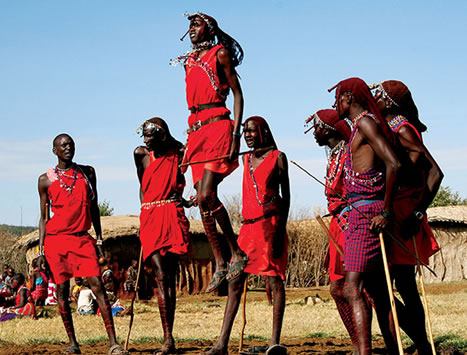 |
Kekur lala olgejep. (Samburu) Watu wa jamii moja hawafichani mambo na hujadiliana juu ya lolote. (Swahili) Les membres de meme famille sont ouvert, l’un a l’autre et peuvent discuter n’importe quoi. (French) Members of the same family are open to each other and can discuss anything. (English) |
Samburu (Kenya) Proverb
Background, Explanation, History, Meaning and Everyday Use of the Proverb
The Samburu are a Nilotic people of north-central Kenya, Maa-speaking group, and
are very similar to the Maasai Ethnic Group. Traditionally the Samburu economy was purely pastoral. They are semi-nomadic pastoralists who herd mainly cattle, but also keep sheep,
goats and camels. Their cattle are their life; their wealth; their livelihood and the symbol of status and success within the community.
The ethnographical location of the Samburu people of Kenya
The Samburu practice polygamy and a man may marry multiple wives as long as he can pay the dowry. A Samburu settlement consists of one family, composed of a man and his wife or wives. As a result of living together, communal activities are carried out such as herding their cattle, camels and goats. The herds of cattle belonging to a household are herded by sons of the different wives.
Samburu family and entertainment
They have many cultural practices related to their lifestyle. Dancing, using fresh blood and meat from their animals for a meal, women constructing the mud houses and not the men, lighting fire using dry sticks, wearing many beautiful ornaments around their necks, wrists, waist and ankles.
Circumcision for both boys and girls has always been a most important ritual. For girls, it signifies becoming a woman. Once circumcised, a girl/woman can be given away in an arranged marriage to start her own family. Ensuring security of the community and their livestock is the duty of the young men, Morans, in the community and they do it as a team.
This Samburu proverb relates to their way of life. Living together and sharing communal activities, meals and responsibilities is a normal way of life. This bonding allows them to feel free to discuss any matters openly with other family members. This cohesion promotes values such as self-respect, perseverance, courage, fellowship and also a strong sense of responsibility.
Biblical Parallels
a. 1 Corinthians 1:10 “I appeal to you, brothers, by the name of our Lord Jesus Christ, that all of you agree, and that there be no divisions among you, but that you be united in the same mind and the same judgment.”
b. Ecclesiastes 4:9-12 “Two are better than one, because they have a good reward for their toil. For if they fall, one will lift up his fellow. But woe to him who is alone when he falls and has not another to lift him up! Again, if two lie together, they keep warm, but how can one keep warm alone? And though a man might prevail against one who is alone, two will withstand him—a threefold cord is not quickly broken.”
Contemporary Use and Religious Application
Family cohesion is greatly emphasized by the Christian Churches. In our current world, families face multiple challenges related to raising children, the reality of crime and violence, the allure of materialism and consumerism, continuing prejudice and intolerance, and elements that often belittle family values.
This Kenyan proverb is used to teach family members to support one another, build strong bonds and trust. They should communicate with each other so that they can help each other. They should not hide issues from each other. They should be a team in all circumstances. Family members should become a pillar for each other, because when they share the difficult or happy issues, they can depend on each other to succeed in handling all matters. Because of this trust, peace and cohesion prevail and grow strong family bonds. Communication is encouraged, creating channels through which each member is able to associate with others.
The Samburu elders make decisions as a team especially where the head of the family has more than one wife. All must be involved in discussions and decision making. Young people have their own activities which help them to link, bond and build a strong sense of responsibility. The women’s communication in a family promotes good behavior, good morals, tolerance, forgiveness and strong sense of responsibilities. The collective lifestyle of the Samburu has a focus on these positive elements and has succeeded through the decades.
This Samburu proverb is No. 13 in the Collection of 100 Samburu (Kenya) Proverbs and Wise Sayings by Margaret Wambere Ireri, in collaboration with the African Proverbs Working Group (Nairobi: Privately Printed, February 2016).
Margaret Wambere Ireri
Nairobi, Kenya
Cellphone: +254 722 537 774
Email: margwireri@yahoo.com
Photographs provided by:
Cephas Yao Agbemenu
Department of Fine Arts
Kenyatta University
P.O. Box 43844
Nairobi, Kenya
Cellphone: +254 723-307992
Email: cyagbemenu@yahoo.com

